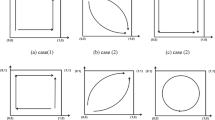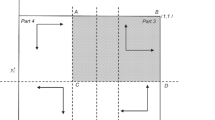Abstract
Carbon emissions from the refining industry are receiving increasing national attention. In view of long-term sustainable development, a carbon pricing mechanism oriented to carbon emission reduction needs to be developed. Currently, the two most common carbon pricing instruments are emission trading system and carbon tax. Therefore, it is important to study the carbon emission problems in the refining industry under emission trading system or carbon tax. Based on the current situation of China’s refining industry, this paper constructs an evolutionary game model for backward and advanced refineries to explore which instrument is more effectively applied in the refining industry and identify the effective factors that can promote carbon emission reduction in refineries. According to the numerical results, if the heterogeneity of enterprises is small, the government’s implementation of an emission trading system is the most effective measure, while carbon tax can only ensure that the equilibrium strategy solution is (1,1) when the tax rate is high. If the heterogeneity is large, the carbon tax policy will not have any effect, indicating that government implementation of an emission trading system is more effective than the carbon tax. In addition, there is a positive relationship between carbon price, carbon tax, and refineries’ agreement to carbon emission reduction. Finally, consumers’ preference for low-carbon products, R&D investment level, and R&D spillover effect have nothing to do with carbon emission reduction. Only by reducing refinery heterogeneity and improving the R&D efficiency of backward refineries can all enterprises agree to carbon emission reduction.

Source: Energy Information Administration


Source: Annual Report of CNPC and Sinopec

Source: China National Bureau of Statistics

Source: China National Bureau of Statistics









Similar content being viewed by others
Data availability
Not applicable.
Notes
Source: China National Bureau of Statistics.
Source: Energy Information Administration.
Source: Annual Report of CNPC and Sinopec.
References
Abdul-Manan AFN, Arfaj A, Babiker H (2017) Oil refining in a CO2 constrained world: effects of carbon pricing on refineries globally. Energy 121:264–275. https://doi.org/10.1016/j.energy.2017.01.046
Barragán-Beaud C, Pizarro-Alonso A, Xylia M, Syri S, Silveira S (2018) Carbon tax or emissions trading? An analysis of economic and political feasibility of policy mechanisms for greenhouse gas emissions reduction in the Mexican power sector. Energy Policy 122:287–299
Borin N, Lindsey-Mullikin J, Krishnan R (2013) An analysis of consumer reactions to green strategies. J Prod Brand Manag 22(2):118–128
Camila BB, Amalia PA, Maria X, Sanna S, Semida S (2018) Carbon tax or emissions trading? An analysis of economic and political feasibility of policy mechanisms for greenhouse gas emissions reduction in the Mexican power sector. Energy Policy 122:287–299
Cao X, Zhang LP (2015) Evolutionary game analysis of the diffusion of green technological innovation of enterprises, China. Populat Resour Environ 25(7):68–76
Chen HM, Wang JX, Miao YJ (2021) Evolutionary game analysis on the selection of green and low carbon innovation between manufacturing enterprises. Alexandria Eng J 60(2):2139–2147
Chen X, Hao G (2015) Sustainable pricing and production policies for two competing firms with carbon emissions tax. Int J Prod Res 53(21):6408–6420
Chen WT, Hu ZH (2018) Using evolutionary game theory to study governments and manufacturers’ behavioral strategies under various carbon taxes and subsidies. J Clean Prod 201:123–141
Chyong CK, Guo B, Newbery D (2020) The impact of a carbon tax on the CO2 emissions reduction of wind. Energy J 41
Du G, Sun C, Ouyang X, Zhang C (2018) A decomposition analysis of energy-related CO2 emissions in Chinese six high-energy intensive industries. J Clean Prod 184:1102–1112
Gielen DJ, Yagita H (2002) The long-term impact of GHG reduction policies on global trade: a case study for the petrochemical industry. Eur J Oper Res 139:665–681
Giri RN, Mondal SK, Maiti M (2019) Government intervention on a competing supply chain with two green manufacturers and a retailer. Comput Ind Eng 128:104–121
D’Aspremont J, Jacquemin A (1988) Cooperative and noncooperative R&D in duopoly with spillovers. Am Econ Rev 78(5):1133–1137
Jiang Y, Li B, Qu X, Cheng Y (2016) A green vendor-managed inventory analysis in supply chains under carbon emissions trading mechanism. Clean Technol Environ Policy 18(5):1369–1380
Jiao J, Chen J, Li L, Li F (2017) A study of local governments’ and enterprises’ actions in the carbon emission mechanism of subsidy or punishment based on the evolutionary game (in Chinese). Chin J Manag Sci 25(10):140–150
Kamien MI, Zang I (2000) Meet me halfway: research joint ventures and absorptive capacity. Int J Ind Organ 18(7):995–1012
Lin B, Wang M (2019) Dynamic analysis of carbon dioxide emissions in China’s petroleum refining and coking industry. Sci Total Environ 671:937–947
Liu C, Huang W, Yang C (2017) The evolutionary dynamics of China’s electric vehicle industry- taxes vs. subsidies. Comput Ind Eng 113:103–122
Liu Z, Lang L, Li L, Zhao Y, Shi L (2021) Evolutionary game analysis on the recycling strategy of household medical device enterprises under government dynamic rewards and punishments. Math Biosci Eng 18(5):6434–6451
Santamaría A, Linares P, Pintos P (2014) The effects of carbon prices and anti-leakage policies on selected industrial sectors in Spain – cement, steel and oil refining. Energy Policy 65:708–717
Song X, Shen M, Lu Y, Shen L, Zhang H (2021) How to effectively guide carbon reduction behavior of building owners under emission trading scheme? An evolutionary game-based study. Environ Impact Assess Rev 90:106624
Strefler J, Kriegler E, Bauer N, Luderer G, Pietzcker R, Giannousakis A, Edenhofer O (2021) Alternative carbon price trajectories can avoid excessive carbon removal. Nat Commun 12:2264
Sun Z, Zhang W (2019) Do government regulations prevent greenwashing? An evolutionary game analysis of heterogeneous enterprises. J Clean Prod 231:1489–1502
Tan R, Lin B (2020) The influence of carbon tax on the ecological efficiency of China’s energy intensive industries—a inter-fuel and inter-factor substitution perspective. J Environ Manage 261:110252
Wiethaus L (2005) Absorptive capacity and connectedness: why competing firms also adopt identical R&D approaches. Int J Ind Organ 23(5):467–481
Wesseh P, Lin B (2018) Optimal carbon taxes for China and implications for power generation, welfare, and the environment. Energy Policy 118:1–8
Wu R, Geng Y, Cui X, Gao Z, Liu Z (2019) Reasons for recent stagnancy of carbon emissions in China’s industrial sectors. Energy 172:457–466
Xie X, Shao S, Lin B (2016) Exploring the driving forces and mitigation pathways of CO2 emissions in China’s petroleum refining and coking industry: 1995–2031. Appl Energy 184:1004–1015
Xu J, Lv X (2014) Evolutionary analysis between governments, manufacturing enterprises and consumers on low-carbon decision-making behavior under the background of low-carbon economy. Oper Res Manage Sci 23(6):81–91
Yang L, Ji J, Wang M, Wang Z (2018) The manufacturer’s joint decisions of channel selections and carbon emission reductions under the cap-and-trade regulation. J Clean Prod 193:506–523
Yang L, Li Y, Liu H (2021) Did carbon trade improve green production performance? Evidence from China. Energy Econ 96:105185
Zhao F, Fan Y, Zhang S (2021) Assessment of efficiency improvement and emission mitigation potentials in China’s petroleum refining industry. J Clean Prod 280(2):124482
Zhang H, Zhang B (2020) The unintended impact of carbon trading of China’s power sector. Energy Policy 147:111876
Zhao T, Liu Z (2019) A novel analysis of carbon capture and storage (CCS) technology adoption: an evolutionary game model between stakeholders. Energy 189:116352
Zhang S, Wang C, Yu C (2019) The evolutionary game analysis and simulation with system dynamics of manufacturer’s emissions abatement behavior under cap-and-trade regulation. Appl Math Comput 355:343–355
Zhao L, Zhang J (2014) Analysis of a duopoly game with heterogeneous players participating in carbon emission trading. Nonlinear Anal: Model Control 19(1):118–131
Acknowledgements
The authors are grateful to the editors who provided valuable comments and suggestions to significantly improve the quality of the paper.
Funding
The work was supported by the Research Foundation of China University of Petroleum-Beijing at Karamay (No. XQZX20220012), Karamay Innovative Environment Construction Plan (Soft Science) Project in 2022, by First Class Academic Discipline Construction project of Central University of Finance and Economics: Research on investment and financing decision and operation management of infrastructure in the new era from the perspective of Interdisciplinary, by Financial Sustainable Development Research Team of Central University of Finance and Economics, and by Teaching Reform Project of China University of Petroleum-Beijing at Karamay (JG2022048).
Author information
Authors and Affiliations
Contributions
Tianyuan He and Jian Guo conceived the study and were responsible for the design and development of the evaluation method. Tianyuan He was responsible for the calculation of the numerical simulation. Tianyuan He wrote the following sections of the article: Introduction, Overview of China’s refining industry, Model, Evolutionary game between refineries, and Numerical simulation. Jian Guo wrote the following sections of the article: Literature review, Conclusions, and Recommendations.
Corresponding author
Ethics declarations
Ethics approval
Not applicable.
Consent to participate
Not applicable.
Consent for publication
Not applicable.
Conflict of interest
The authors declare no competing interests.
Additional information
Responsible Editor: Ilhan Ozturk
Publisher's note
Springer Nature remains neutral with regard to jurisdictional claims in published maps and institutional affiliations.
Rights and permissions
Springer Nature or its licensor (e.g. a society or other partner) holds exclusive rights to this article under a publishing agreement with the author(s) or other rightsholder(s); author self-archiving of the accepted manuscript version of this article is solely governed by the terms of such publishing agreement and applicable law.
About this article
Cite this article
He, T., Guo, J. The effects of carbon pricing instruments on carbon emission reduction in China’s refining industry: an evolutionary game between heterogeneous refineries. Environ Sci Pollut Res 30, 69599–69615 (2023). https://doi.org/10.1007/s11356-023-27327-0
Received:
Accepted:
Published:
Issue Date:
DOI: https://doi.org/10.1007/s11356-023-27327-0




